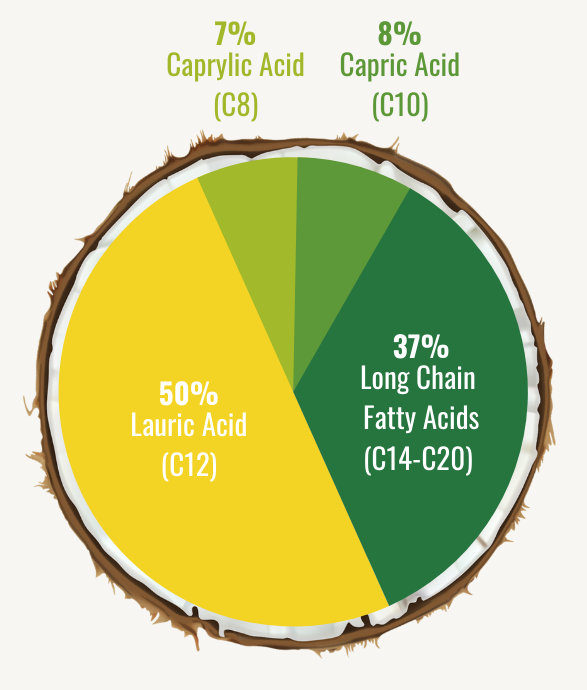BENEFITS OF MCTs YOU NEVER NEW
6 Science-Backed Benefits
That you can get from adding Medium Chain Triglycerides to your diet.
Medium-chain triglycerides (MCTs) are one of the most bioavailable sources of energy compared to other edible oils on the market today. When added to your diet MCTs are metabolized more quickly than other fatty acids to provide instant energy without being stored as fat.
Here’s your guide to MCT oil benefits and how to use them.
WHAT ARE MCTs?
MCT oil is a form of “healthy” saturated fatty acids that are extracted from coconut oil (the most common source) or palm kernel oil. MCTs are also called “MCFAs” for medium-chain fatty acids.
Most of the oils and oil products used to make things like stir fry and salad dressings (olive oil, for example) are longer-chain triglycerides, which means they have the highest number of carbon atoms in their fatty acids. Medium-chain triglycerides (MCTs), on the other hand, have a medium number of carbon atoms — between six and 12.
TYPES OF MCTs?
Regular coconut oil naturally contains 50% Lauric Acid (C12), 7% Caprylic Acid (C8), 8% Capric Acid (C10), and the remaining 37% being Long Chain Fatty Acids (C14 - C20)
Typically MCT fatty acids are those that have a chain length of 6–10 carbon atoms instead of 12. That’s because lauric acid is often classified as an LCT because it’s digested and absorbed much slower than the other MCTs.
There are 4 different types of naturally-occurring medium-chain triglycerides found in coconut oil. There are some that are likely more effective than others so it’s important to know the differences.
Caproic Acid (C6)
Caprylic Acid (C8)
Capric Acid (C10)
Lauric Acid (C12)
Generally speaking, the shorter the chain (meaning the lower the number of carbons the acid has), the faster the body can turn the fatty acids into usable energy.
HEALTH BENEFITS:
1. PROMOTES WEIGHT LOSS IN SIX IMPORTANT WAYS
- MCT’s have shown to increase the release of two hormones that promote the feeling of fullness in the body: peptide YY and leptin
- It may even be better than coconut oil in keeping you full. One study found that people taking two tablespoons of MCT oil as part of their breakfast ended up eating less food for lunch compared to those taking coconut oil
- Taking MCT oil has been shown to significantly reduce body weight and waist circumference. Researchers even report that it could help prevent obesity
- MCT oil has about 10% fewer calories than long-chain triglycerides (LCTs), which are found in foods such as olive oil, nuts and avocados
- Your body also processes MCTs differently, which may help you burn calories. Your body can use MCT oil as an instant source of energy, making it unnecessary to store fat for this purpose.
- MCTs can be converted into ketones, which are produced from the breakdown of fat when carb intake is low. If you’re following a ketogenic diet, which is very low in carbs yet high in fat, then taking MCT oil can help you stay in the fat-burning state known as ketosis.
2. INSTANT SOURCE OF ENERGY THAT CAN ALSO BE USED TO FUEL YOUR BRAIN
- A super fuel since your body absorbs MCTs more rapidly than long-chain triglycerides (LCTs), which contain more carbons in their fatty acid chains
- Due to their shorter chain length, MCTs travel straight from the gut to the liver and do not require bile to break down like longer-chain fats do
- Since MCTs easily enter your cells without being broken down, they can be used as an immediate source of energy
- When you’re on a ketogenic diet, MCTs can also be converted into ketones in the liver. These ketones can pass through your blood-brain barrier, making them a convenient source of energy for your brain cells.
3. MAY REDUCE LACTATE BUILDUP IN ATHLETES AND HELP BURN FAT FOR ENERGY
- During exercise, rising lactate levels can negatively impact exercise performance. Interestingly, MCTs may help reduce lactate buildup.
* One study found that athletes who took 6 grams or about 1.5 teaspoons of MCTs with food before cycling had lower lactate levels and found it easier to exercise, compared to those taking LCTs
- MCT oil before exercise may help you use more fat instead of carbs for energy.
- One study showed it could improve swimming capacity in mice, but another human-based study found no improvement in endurance performance in runners
4. COULD HELP MANAGE EPILEPSY, ALZHEIMER’S DISEASE, AND AUTISM
- Studies have shown that MCT oil and a ketogenic diet may help manage conditions such as epilepsy, Alzheimer’s disease, and autism
- EPILEPSY; Scientists found that fasting increases ketone production and that this may reduce the frequency of epileptic seizures. Since MTCs can be converted into ketones, they may be beneficial in managing epilepsy.
- ALZHEIMER’S DISEASE; Alzheimer’s disease impairs your brain's ability to use sugar. An MCT ketogenic diet offers an alternative energy source: ketones. This allows brain cells to survive better. It also blocks a receptor in the brain that causes memory loss.
- While genetic factors play a role, evidence suggests that 20–70 grams of supplemental MCTs that include caprylic or capric acid can modestly improve the symptoms of mild-to-moderate Alzheimer’s.
- AUTISM; MCT oil may also help children with autism. One study found positive overall improvements when a ketogenic diet was followed for 6 months. Another study found that adding MCTs to a ketogenic and gluten-free diet substantially improved autism behaviors for 6 of the 15 children involved.
5. MAY REDUCE RISK FACTORS FOR HEART DISEASE
- MCT oil has been shown to support weight and fat loss. This may, in turn, help reduce your risk of heart disease. A study of 24 overweight men found that taking MCT oil combined with phytosterols and flaxseed oil for 29 days reduced total cholesterol by 12.5%. However, when olive oil was used instead, the reduction was only 4.7%
- MCT oil can also increase the production of heart-protective HDL or “good” cholesterol. It can even significantly reduce C-reactive protein (CRP), an inflammatory marker that increases the risk of heart disease.
6. MAY HELP CONTROL BLOOD SUGAR LEVELS AND SUPPORT DIABETES MANAGEMENT
- Most people with type 2 diabetes are overweight or obese, which makes diabetes harder to manage. However, MCTs have been shown to reduce fat storage and increase fat burning.
- One small Chinese study of 40 people with diabetes found that those who consumed MCT oil daily had significant reductions in body weight, waist circumference and insulin resistance, compared to those taking corn oil containing LCTs.
WHAT IS THE DIFFERENCE BETWEEN 6040 AND C898 MCT OIL?
The only difference between 6040 and C898 products is the MCT intake. 6040 blended MCT Oils is a combination of both C8 (Caprylic Acid) and C10 (Capric Acid) while C898 MCT Oil contains approximately 98% of C8 (Caprylic Acid) with small traces of other MCTs lingering. Both C8 and C10 MCTs boost ketone production, reduce fat storage, increase fat burning, and can help improve cognitive performance. But generally due to the longer carbon chain of C10 it takes a bit longer for the body to process into ketones.
DIFFERENCE BETWEEN ORGANIC MCT & NON-ORGANIC MCT?
The difference between organic and non-organic is how the farmers produce the coconuts. In non-organic MCT oil, they use chemicals such as inorganic fertilizers, pesticides, etc. while in the organic MCT oil they are not using any chemicals the main requirement for organic coconut farming is the soil and the climate. The ideal soil condition for better plant growth are proper drainage, good water-holding capacity, and presence of water, and about on the climate, the best is a tropical climate. It means typically hot, very humid, and wet.
During production, the main aim of organic coconut farming is the quality of the production of products that contain no chemical residues and maintain soil fertility. Organic production is designed to promote biological diversity, enhance the healthy use of soil, water, and air, and minimize also all the forms of pollution that result from agricultural practices.
Overall there is no difference from a specification point between non-organic and organic MCT Oil, only the source material used during production. Different markets prefer "organic", especially the nutrition side for marketing purposes. Taste and smell-wise are still the same.
REFERENCES;
1) Impact of medium and long chain triglycerides consumption on appetite and food intake in overweight men; https://www.ncbi.nlm.nih.gov/pmc/articles/PMC4192077/
2) Gut Microbiota and Metabolic Health: The Potential Beneficial Effects of a Medium Chain Triglyceride Diet in Obese Individuals; https://www.ncbi.nlm.nih.gov/pmc/articles/PMC4882694/
3) Coconut oil has less satiating properties than medium-chain triglyceride oil; https://www.sciencedirect.com/science/article/abs/pii/S0031938417302111
4) Greater rise in fat oxidation with medium-chain triglyceride consumption relative to long-chain triglyceride is associated with lower initial body weight and greater loss of subcutaneous adipose tissue.; https://www.ncbi.nlm.nih.gov/pubmed/12975635
5) Medium-chain triglycerides increase energy expenditure and decrease adiposity in overweight men.; https://www.ncbi.nlm.nih.gov/pubmed/12634436
6) Weight-loss diet that includes consumption of medium-chain triacylglycerol oil leads to a greater rate of weight and fat mass loss than does olive oil.; https://www.ncbi.nlm.nih.gov/pubmed/18326600
7) Medium Chain Triglyceride Oil Consumption as Part of a Weight Loss Diet Does Not Lead to an Adverse Metabolic Profile When Compared to Olive Oil; https://www.ncbi.nlm.nih.gov/pmc/articles/PMC2874191/
8) Enhanced thermogenesis and diminished deposition of fat in response to overfeeding with diet containing medium chain triglyceride.; https://www.ncbi.nlm.nih.gov/pubmed/7072620
9) Twenty-four-hour energy expenditure and urinary catecholamines of humans consuming low-to-moderate amounts of medium-chain triglycerides: a dose-response study in a human respiratory chamber. https://www.ncbi.nlm.nih.gov/pubmed/8654328
10) The application of medium-chain fatty acids: edible oil with a suppressing effect on body fat accumulation. https://www.ncbi.nlm.nih.gov/pubmed/18296368
11) Short- and medium-chain fatty acids in energy metabolism: the cellular perspective.; https://www.ncbi.nlm.nih.gov/pubmed/27080715
12) Effect of ingestion of medium-chain triacylglycerols on moderate- and high-intensity exercise in recreational athletes.; https://www.ncbi.nlm.nih.gov/pubmed/19436137
13) Medium-chain triglycerides are advantageous in promoting weight loss although not beneficial to exercise performance. https://www.ncbi.nlm.nih.gov/pubmed/20367215
14) Swimming endurance capacity of mice is increased by chronic consumption of medium-chain triglycerides. https://www.ncbi.nlm.nih.gov/pubmed/7876928
15) Dietary long-chain, but not medium-chain, triglycerides impair exercise performance and uncouple cardiac mitochondria in rats. https://www.ncbi.nlm.nih.gov/pubmed/21806803
16) Mechanisms of action for the medium-chain triglyceride ketogenic diet in neurological and metabolic disorders https://www.sciencedirect.com/science/article/abs/pii/S1474442217304088
17) Medium-chain fatty acids inhibit mitochondrial metabolism in astrocytes promoting astrocyte-neuron lactate and ketone body shuttle systems. https://www.ncbi.nlm.nih.gov/pubmed/26839375
18) Seizure control by ketogenic diet-associated medium chain fatty acids https://www.ncbi.nlm.nih.gov/pmc/articles/PMC3625124/
19) Seizure control by derivatives of medium chain fatty acids associated with the ketogenic diet show novel branching-point structure for enhanced potency. https://www.ncbi.nlm.nih.gov/pubmed/25326131
20) Effects of beta-hydroxybutyrate on cognition in memory-impaired adults. https://www.ncbi.nlm.nih.gov/pubmed/15123336
21) A modified ketogenic gluten-free diet with MCT improves behavior in children with autism spectrum disorder https://www.sciencedirect.com/science/article/abs/pii/S0031938418300507
22) Application of a ketogenic diet in children with autistic behavior: pilot study. https://www.ncbi.nlm.nih.gov/pubmed/12693778/
23) Metabolic Dysfunction Underlying Autism Spectrum Disorder and Potential Treatment Approaches https://www.ncbi.nlm.nih.gov/pmc/articles/PMC5318388/




